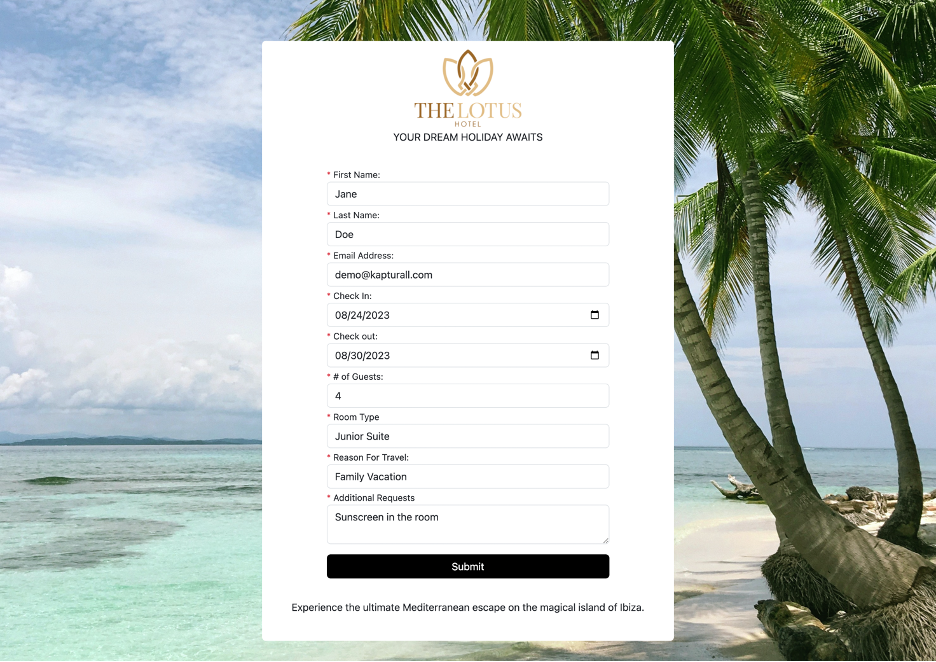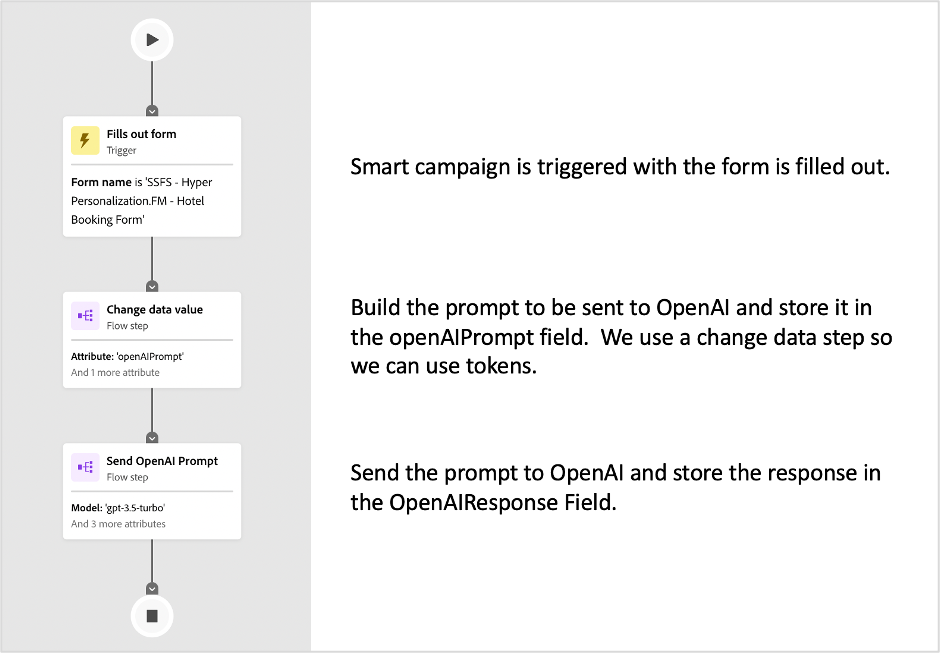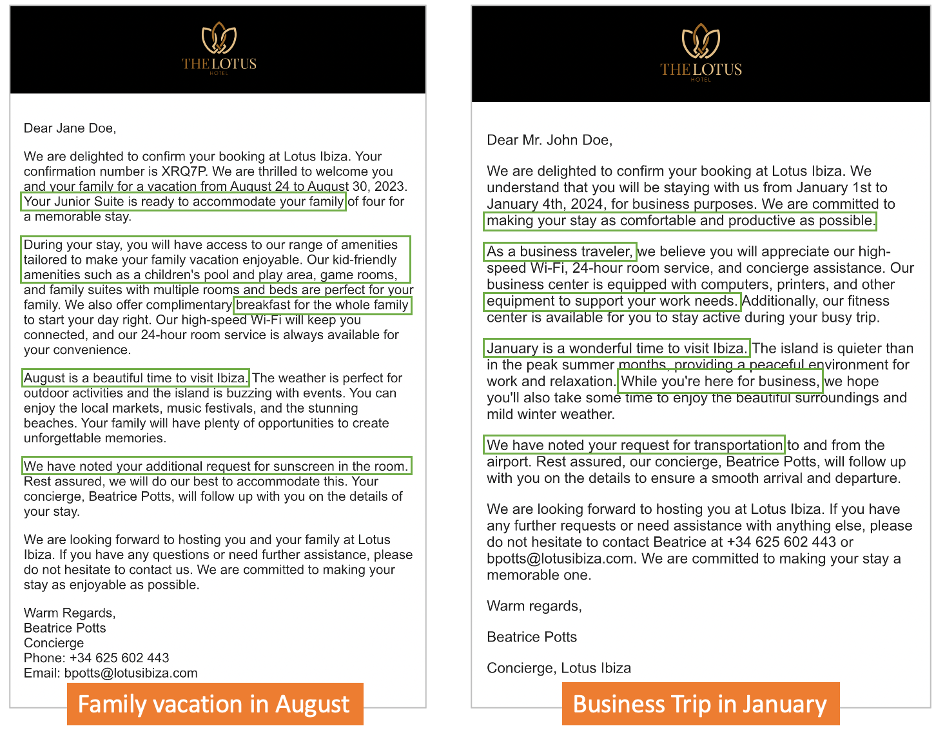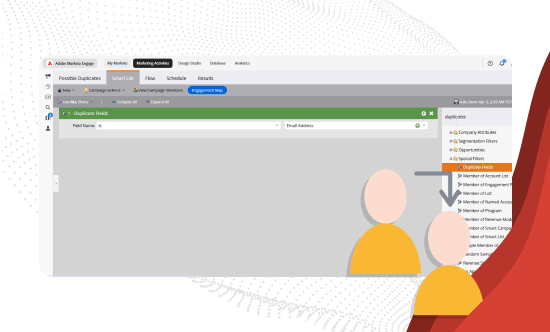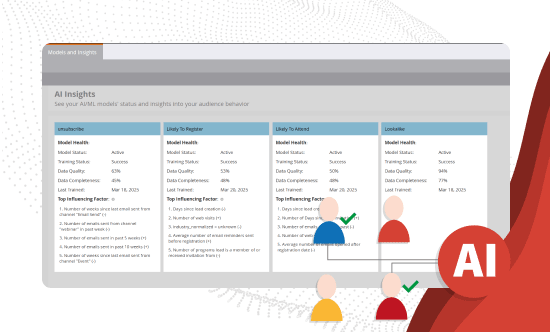Hyper Personalization with Marketo & OpenAI
Overview
Here’s the thing. If your top priority now is looking for a way to acquire more leads, then probably it’s not the time for lead scoring. Not yet, anyway. That’s because lead scoring is about improving the quality of your leads, not generating more. If anything, it reduces the number of potential leads, so that your sales team can focus their efforts on those people who have better chances of converting to an opportunity, or even better, converting to a buying client
In this demo we will use our OpenAI Self-Service Flow step for Marketo. If you don’t have the Send OpenAI Prompt action you can get it here. magine a hotel in Ibiza, Spain that wants to personalize the confirmation emails sent to customers after they make a booking. The typical approach would be to use tokens and dynamic content, which is an effective method when executed correctly. But when it comes to an industry like hospitality, there’s a need for a warmer welcoming tone. That’s where AI can step in to make things feel more human. Enter hyper personalization – a concept that goes beyond simple dynamic content. It adds a handwritten feel to every message, making each one unique while remaining accurate and aligned with the brand. Achieving this requires the right data, guidance, and an AI model. In this demo we are going to build a AI personalized booking confirmation email. You can try it out yourself here To illustrate how this works, we will use a Marketo form for collecting booking data. In a real-world application, this could be replaced by any third-party booking system, as long as the data can be passed on to OpenAI. Key data points include the dates, room type, reason for travel, and any additional requests. These will be crucial in guiding the AI model. Next, a smart campaign is set up. In the Smart List of our Smart Campaign we have a triggered anytime someone fills out the booking form. In the Flow of our smart campaign we have 2 steps. 1. We use a Change Data Value step to build our OpenAI prompt using tokens and storing it in the OpenAI prompt field. Note, we could use any field as long as it is set in the configuration of the OpenAI Flow Step. The prompt we will use is: Name: {{lead.First Name}} {{lead.Last Name}} Based on the above data write a human sounding, personalized booking confirmation email body using HTML tags (p,li,span, etc.), left aligned to be placed in an HTML emailWith the most relevant Amenities given, for the above booking details. Please follow the following format: 1st paragraph: a warm welcoming intro and summary about the booking personalized based on their group size, duration of stay and reason for travel. 2nd paragraph: a description of the amenities available, only include a few that are relevant to their reason for travel, duration of stay and group size 3rd Paragraph: A paragraph about the time period of the booking, what Ibiza is like in this time period and what activities are typically going on at that time. Note if there are any well known events common in the timeframe Personalized based on their reason for travel 4th Paragraph: Acknowledge any additional requests, highlight doubt only if they seem extreme, and say that their concierge will follow up with them on the details. A final personalized paragraph saying we are looking forward to hosting them signed by their concierge. 2. Sending the prompt to OpenAI via a self-service flow step.The second step returns the AI-generated message, employing a “temperature” setting of ten out of 100. You can think of this parameter as controling the AI’s creativity level, with higher numbers indicating greater creativity. However, it’s crucial to keep this balanced, as higher values can lead to the model getting creative with facts, which can be problematic. The second step returns the AI-generated message, employing a “temperature” setting of ten out of 100. You can think of this parameter as controling the AI’s creativity level, with higher numbers indicating greater creativity. However, it’s crucial to keep this balanced, as higher values can lead to the model getting creative with facts, which can be problematic. An “additional context” field can be used to input non-dynamic data, like hotel information and amenities. This field can be thought of as an overflow for the prompts and can be used to provide GPT with more specific data. In future posts I will dive into how you can connect these models to extensive data sources, internet resources and other tools, but for this scenario we are simply using OpenAI’s GPT “as-is”, which is more than capable. Concierge: Name: Beatrice Potts Hotel Amenities: – Business center with computers, printers, and other equipment – Meeting and conference rooms – High-speed Wi-Fi – 24-hour room service and concierge assistance – Fitness center for staying active during busy trips In-room couples massages – Champagne and chocolate-covered strawberries upon arrival – Private balconies or terraces with romantic views – Romantic dinner packages at on-site restaurants Jacuzzi tubs for two in the room – Kid-friendly amenities, such as a children’s pool or play area – Complimentary breakfast for the whole family – Family suites with multiple rooms and beds – Game rooms or arcades for family fun – Cribs or rollaway beds for young children – On-site spa with a range of treatments – Yoga or meditation classes – Quiet rooms or adult-only areas – Outdoor pools and hot tubs for relaxation – Complimentary tea or coffee in the lobby Hotel Details: Website: ww.lotusibiza.com Concierge Name: Beatrice Potts Concierge Email: guestservices@lotusibiza.com Address: Carrer Camí de sa Torre, 71, 07810 San Juan Bautista, Ibiza, Spain The data passed to OpenAI in the prompt includes all the booking data from the form and instructions for assembling the booking confirmation. While the AI is given specific formats and data about the hotel, it can also be directed to utilize its own knowledge base for personalizing the message. The degree to which GPT customizes the messages depends on the prompts. They can be very specific or provide a degree of freedom to the AI. It’s important to test the prompts beforehand to ensure accuracy and correct formatting. Once we have our booking confirmation text from OpenAI, we need to send it to our guest. To keep things simple for this demo, we will create a new smart campaign that triggers on any time the OpenAI Response field is updated. In a production environment to avoid false triggers, you would want to be more perscriptive with this. Then in the Flow we just need to send the email In the body of the email we just use the OpenAI response token: {{lead.OpenAI Response}} To illustrate the effectiveness of this process, consider two booking variations: a family vacation booking for 4 in August and a business trip for 1 in January. The personalized messages for both scenarios are remarkably different. While the business trip message emphasizes the business center and gym, the family vacation booking focuses on kid friendly amenities and recreational activities. The AI model is also location and time-aware allowing it to provide specific details for the bookings like weather, local events and how busy the events. While minor errors may occur due to weak written guidelines or an overly high temperature setting, thi can easily be refined to get reliably great results. Simply revising the prompts and adjusting the temperature can significantly improve the output. In essence, hyper personalization with AI has the potential to provide a warm, authentic, and highly tailored customer experience. AI is not just about automating tasks; it’s also about adding a human touch to digital communications, a crucial factor in industries like hospitality.OpenAI Self-Service Flow Step for Marketo Integration
Scenario: A Hotel in Ibiza, Spain
Implementing Hyper Personalization: The Setup
Check-In Date: {{lead.Start Date}}
Check-out date: {{lead.End Date}}
Travel Reason: {{lead.Travel Reason}}
# of Guests: {{company.Number of guests}}
Room type: {{lead.Room Type}}
Additional Requests: {{lead.Additional Requests}}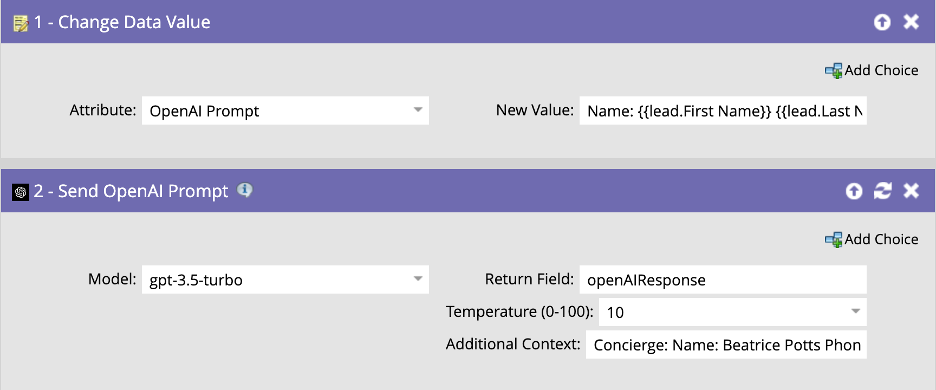
Making Use of Additional Context
Phone: +34 625 602 443
Email: bpotts@lotusibiza.com
Using the OpenAI response
Diving into Results
Perfecting the Process
SIGN UP FOR OUR NEWSLETTER
Josh Arrington
Maketo Champion & CMTO
Marketing technology consultant & full stack developer specializing in marketing automation, strategy and highly effective campaign execution. Recently named Marketo Champion by Adobe. Over 18 years of experience working with companies to identify the right mix of marketing technologies and putting them to work with profitable purpose.

